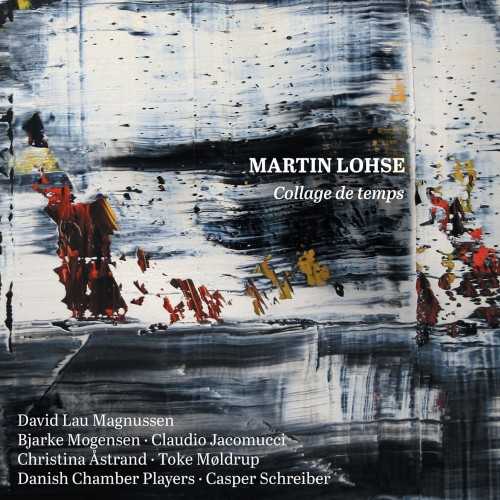
Composer: Martin Lohse
Audio CD
Number of Discs: 1
Format: FLAC (tracks)
Label: Dacapo
Size: 939 MB
Recovery: +3%
Scan: yes
Collage de temps
Concerto for piano and sinfonietta
01. I. Presto con sonore
02. II. Andante poco dolente
03. III. Andante cantabile
04. IV. Moderato più mosso
05. V. Allegro poco agitato
5 Momenti mobile
for accordion duo and piano trio
06. No. 1, Allegro con passione sostenuto
07. No. 2, Andante con dolore sostenuto
08. No. 3, Moderato con brio
09. No. 4, Menuetto. Allegro grazioso con espressione
10. No. 5, Allegro meno mosso
Moto immoto
for sinfonietta
11. Adagio con passione sostenuto
David Lau Magnussen, piano
Christina Åstrand, violin
Toke Moldrup, cello
Bjarke Mogensen, accordion
Claudio Jacomucci, accordion
Danish Chamber Players
Casper Schreiber, direction
The first couple of minutes of the piano concerto Collage de temps already give a crystal-clear, audible example of Martin Lohse’s composition technique, which he calls ‘mobile’. Fifteen seconds into the movement a rhythmically striking figure begins which appears in a variety of instrumental colours: in the piano, later with an emphasis on strings, then on the winds and with the sound of the full ensemble. A good minute later the character changes completely, and does so again shortly afterwards, and then again. The music hangs in front of the listener as independent figures – mobiles – and although they constantly show new sides of themselves you recognize them easily. Without invoking the parallel too strictly – it will not bear that – the listening experience when you concentrate on Lohse’s acoustic mobiles is almost like hearing an old Baroque rondo. First one theme comes, then another, then the first one comes back, a third shows its face, the first one returns etc. This parallel make sense not so much in the precise structuring of the score as in the experience of the listener: on the face of it we hear ‘the same’, but we have been changed by the time that has passed, so the music is not identical either to what we heard before.
There are several layers in Lohse’s music. The mechanical drive from the first theme in Collage de temps is saturated with the driving force and rhythmic certainty of American minimalism, and later motifs can cast the listener’s associations in the direction of Schubert’s Moments musicaux and Verdi’s operas. There is thus a tonal recognizability in the sculptural sound-universe. In purely thematic terms we are not far from the tonal language of the past. But the way the music is put together is radically different. The point of the title, Collage de temps – collage of times or tempi, or composite times or tempi – is almost self-evident when one listens to the music, and is a precise description of what one hears: times that have been put together. Both musical ‘times’ – tempi that are put together with other tempi – and a mixture of times and idioms from musical history, from the dance suites of the Baroque through the elegance of the Rococo and the emotional outbursts of Romanticism to the rhythmic swing and motif repetitions of Minimalism. The role of the piano soloist changes depending on the musical motif: sometimes as an integral part of the ensemble, sometimes more like a rampant bull in a china shop; sometimes again as a fully fledged soloist with emphatic, striking musical expression.